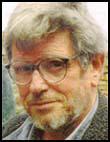Angus Calder

Angus Calder, the son of Ritchie Calder, was born in London on 5th February 1942. After reading English literature at Cambridge University he wrote a doctorate at Sussex University on politics in Britain during the Second World War.
Calder married Jenni Daiches, the daughter of David Daiches, in 1963. The couple had three children.
In 1969 Calder published his book on the Home Front entitled The People's War: Britain 1939-1945. As Ian Campbell pointed out this "was the first substantial work to question conventional wisdom on wartime Britain" The book won the John Llewellyn Rhys Prize in 1970.
In 1971 Calder moved to Scotland and became an Open University tutor based in Edinburgh. Over the next few years he published Russia Discovered: Nineteenth-Century Fiction from Pushkin to Chekhov (1976) and Revolutionary Empire (1981). After divorcing his first wife he was briefly married to Kate Kyle. The Myth of the Blitz appeared in 1992.
Calder, who became a reader of cultural studies at the Open University, retired in 1993. In his later years he suffered from alcoholism. Other books by Calder include Revolving Cultures (1994) Time to Kill: Soldier's Experience of War in the West, 1939-45 (1997), Scotland of the Mind (2002), Gods, Mongrels and Demons (2004) and Disasters & Heroes: On War, Memory and Representation (2004).
Angus Calder died of lung cancer on 5th June 2008.
Primary Sources
(1) Bernard Crick, The Guardian (10th June, 2008)
Angus Calder, who has died aged 66 from lung cancer, was an extraordinarily versatile writer - historian, poet and essayist - and a stirring figure on the Scottish scene. He gained prominence with the publication, in 1969, of his first book, The People's War: Britain 1939-1945. A pioneering study of the home front, dispassionate and, at times, ironic when modifying the lingering myths of wartime propaganda, it won the John Llewellyn Rees prize and has remained in print ever since.
Not until 1981 did another major work appear, Revolutionary Empire, a deeply researched account of British imperial expansion that was no-holds-barred tendentious, as was The Myth of the Blitz (1992). Yet both Calder's zeal for wide reading and his way of life worked against the production of more major books, though, in 2004, he produced two fascinating late collections of black humour, Gods, Mongrels and Demons: 101 Brief But Essential Lives and Disasters and Heroes: On War, Memory and Representation. Instead, his breadth of knowledge and intense, if spasmodic, concentration encouraged his positive mastery of the essay.
The drink had led to the break-up of his marriage in 1982. However, in and out of recurrent bouts of drinking followed by spasmodic abstinence, a remarkable number of fine essays appeared. When one thought he was out for the count, he was up again and into print. He edited notable selections of Hugh MacDiarmid, Walter Scott, 19th-century Russian fiction, the poems of Burns and of Robert Louis Stevenson, and, with Paul Addison, Time to Kill: The Soldier's Experience of the War in the West 1939-45. He published verse throughout his life, winning the Eric Gregory Award for poetry in 1967, but brought out his first volume of poems, Waking in Waikato, in 1995. He was co-editor of the Journal of Commonwealth Literature from 1981 to 1987.
(2) Ian Campbell, The Independent (10th June, 2008)
The two thrusts of Angus Calder's research and publishing interests were therefore established: well-researched and soundly based histories, and close studies of literary figures from 20th-century Scotland. Among his histories, the magisterial The People's War: Britain 1939-1945 (1969) was the first substantial work to question conventional wisdom on wartime Britain, and won him the Mail on Sunday/John Llewellyn Rhys Prize the year following publication. The revisionist theme continued with Revolutionary Empire (1981) and The Myth of the Blitz (1991).
His literary studies included Revolving Culture: notes from the Scottish Republic (1994), and an edited collection of Hugh MacDiarmid's prose, The Raucle Tongue: selected essays, journalism and interviews (in three volumes, 1997-98) – the latter, like many of his works, collaboratively edited.
These are merely high points: the very extensive bibliography of teaching books, introductions and collections, overlooking his own creative writing and five volumes of poetry, points to the other main thrust of his life, his long involvement with the Open University in Scotland where he inspired and nurtured the careers of a generation.
One other title, Russia Discovered: nineteenth-century fiction from Pushkin to Chekhov (1976) is (as I can testify from using it in university teaching for many years) exemplary of Calder's strong qualities: lucidity of organisation, the ability to connect across barriers of language and background to illuminate text, and a strength in overall construction which is particularly visible in his substantial historical writing. The Myth of the Blitz in particular is able to give a vivid picture of a complex society under stress to a generation born too late to have experienced it.
A particular strength of Calder's writing was his involvement with oral history, recording the experiences of those who had lived through such events as the Blitz and seen it at more uncomfortably close quarters than historians had done. Like all his historical writing, his depiction of London life at this extreme moment was characterised by lucidity: he did not obtrude on events so much as make them vividly alive to the reader.

